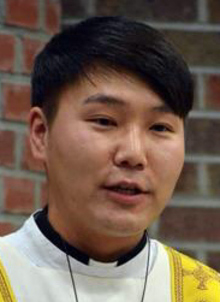After August ordination Enkh will be the leader of Mongolia’s Catholics, all 1,000 of them
 |
Baatar Enkh
|
“I’d like this to be a just world of humane love, one where we transcend things like religion, nationality, ideology, and philosophy so that everyone can be happy.”
These were the remarks by Mongolia’s first Catholic priest, Baatar Enkh, as he prepared to return to Ulaanbaatar on Jan. 18 after graduating from Daejeon Catholic University.
After becoming a socialist state in 1924, Mongolia did not have freedom of religion until its liberation in the 1990s. Catholicism was only introduced there in 1992. By this August, though, Mongolian Catholicism will have the first priest in its short history.
“My eight years in Korea have been a precious time for me, where I’ve felt and experienced many things in general,” said Enkh, 29.
“Just meeting new people and experiencing new culture in another country has been good for me,” he added.
Enkh’s first experience with Catholicism came at eight years old via a missionary at the French language school his older sister attended. He majored in bioengineering in Mongolia before arriving in South Korea in Aug. 2008 with the aim of becoming a priest.
“In 2004, I left home and went to live at the church, and my mother cried for three months when I told her I was going to seminary,” he recalled. “I ended up graduating from an ordinary university first because of her objections.”
Enkh’s family members, including his mother and sister, later converted to the faith and were baptized in 2007, he added.
Enkh studied Korean for three years in Mongolia and attended a language school in South Korea for another six months, but still experienced difficulties communicating when he first enrolled, he said.
“When reading the Bible in Korean, I would have to look up everything in the dictionary to see the meaning, and I think that actually allowed me to study it more deeply,” he added.
Enkh’s mother and sisters also visited South Korea in Dec. 2014 to attend his ordination ceremony as a deacon at Daeheung-dong Cathedral in Daejeon. It was on this occasion, he said, that he resolved to become a priest.
“My father died in a traffic accident when I was eight, and seeing my mother’s struggles really made me sense my own lack of strength,” he recalled. “I was very young, but it made me realize life isn’t just happiness. There’s a lot of things in life, like grief and these big and small goodbyes.”
Only around 1,000 Catholics live in Mongolia today, with just 10 cathedrals in the country. The lack of any Mongolian translation of the Catholic Bible means the churches are currently forced to use a Protestant version.
Enkh, whose ordination is scheduled for Aug. 28 at the Cathedral of Saint Peter and Saint Paul in Ulaanbaatar, said he plans to return to South Korea in the future to visit friends.
By Lee Kil-woo, senior staff reporter
Please direct questions or comments to [english@hani.co.kr]
Source:http://www.hani.co.kr/


0 comments:
Post a Comment